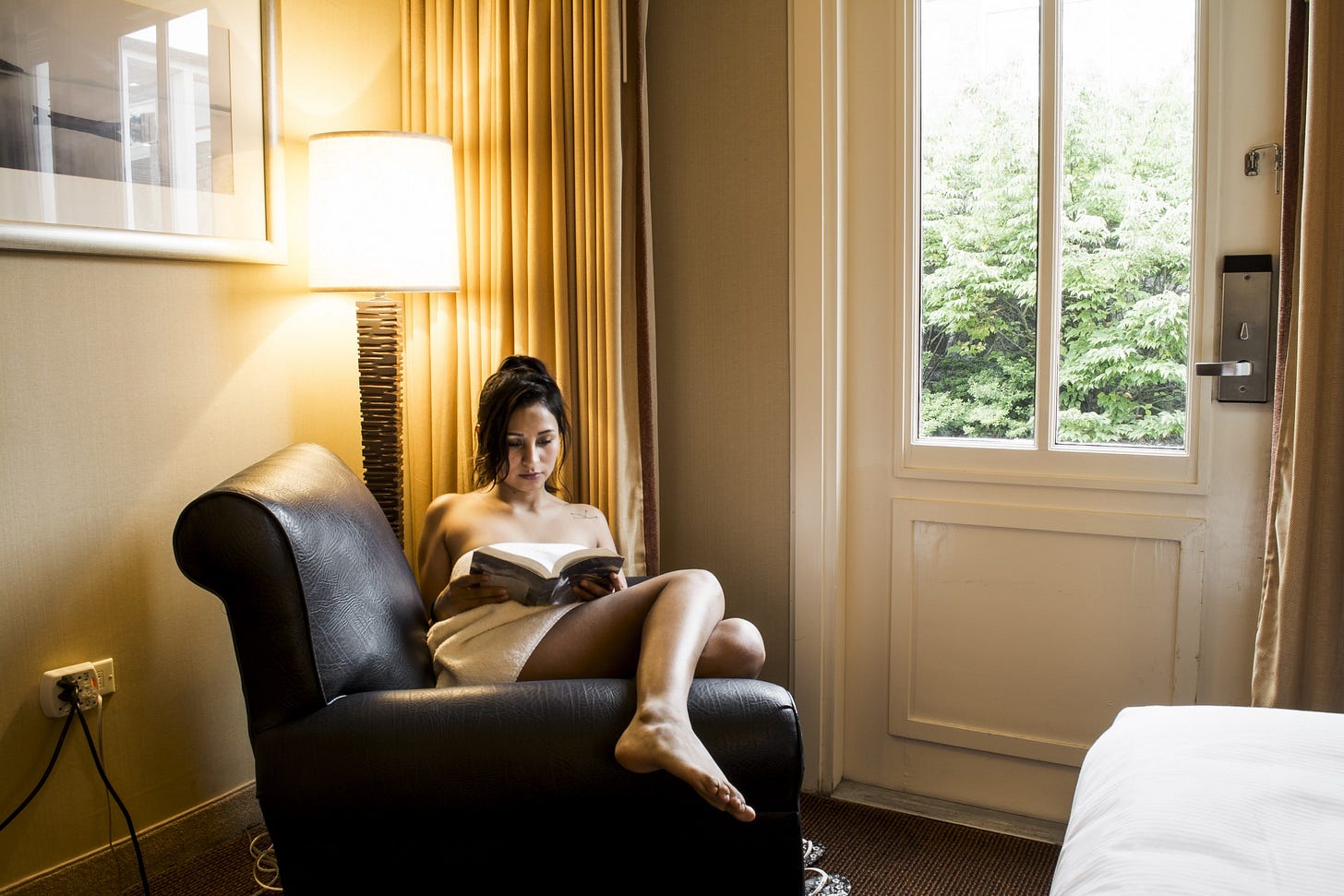11 Practical Tips to Build a Lifetime Reading Habit
From a lifelong reader who has read hundreds of books

My love for books first began when I was a preschooler and my mom read to me before bed every night. I would doze off lost in my imagination of talking animals, mischievous goblins, glistening treasures, fairies, magical rings, etc.
I can’t thank my mom enough for sowing the seed which would sprout and grow into a powerful and life-changing habit. I am not exaggerating when I say life-changing as such is the sheer power of reading.
My reading journey started with children’s magazines. I still vividly remember how I would prance in joy whenever my monthly editions of the Chandamama, Champak, Gokulam, and Tinkle were delivered.
Over the years, my “taste” in books and genre preferences have constantly changed — short stories, horror, fantasy fiction, thrillers, realistic fiction, magical realism, and now classics and nonfiction.
But one thing that has remained constant is my love for books and reading in general. I want to share 11 tips to help you cultivate a lifetime reading habit.
1. Start small.
I see a lot of people start their reading journey with high reading level books and lofty goals. Needless to say, they soon give up complaining that reading is hard.
When you first start off, start small — pick short easy-to-read books and set small goals like “I will read for 30 minutes every day” rather than “I will read a book a day”. Gradually pick harder to read books and set higher goals.
Your first book can make or break your love for reading. Here are eleven books across different genres that I think are excellent for beginners.
2. Have a reading hour.
In the initial days, it is essential to have a reading habit because if you don't it becomes easy to procrastinate and you may end up not reading altogether.
Decide on roughly how long you want to read and pick a convenient time, something that you can stick to every day. I personally like to read for close to an hour before going to bed every night.
Finding a comfortable reading duration is very important — if you decided on an hour but are finding yourself losing interest and focus after 30 minutes, cut down your time to 30 minutes a day only.
3. Make a wish list of books.
Goodreads is an amazing platform that I strongly recommend for anyone that loves reading. I personally use it to track the books I have read and to find new books.
You can find new books by looking through the recommendations and explore pages.
If any book piques your interest, you can go through the reviews and ratings given by other readers. If you decide you want to read it, you can add it to your wishlist.
Irrespective of whether you choose to use Goodreads or not, just maintain some form of a wishlist of books that you look forward to reading.

4. Quit a book if you don’t enjoy it.
When you find yourself not enjoying a certain book, you lose interest and the process of reading starts to feel tedious which is not desirable at all.
This happens for two main reasons:
You feel that the book has too much vocabulary, is too lengthy, or in general of a higher reading level. This is the case most often.
You find the book to be actually bad.
It is completely okay to quit the book — if it were the first case you can always come back to it later on.
The first time I picked up One Hundred Years Of Solitude by Gabriel Garica Marquez I quit it after the first few pages. The next time I picked it up, I saw it through the end and regard it as one of the best books I’ve ever read.
So don’t feel guilty and move on. There are millions of other books to choose from.
5. Maintain a reading queue.
When you maintain a reading queue, you won’t run out of books to read and this can greatly help with staying consistent.
Back when I didn’t have one, I would read sporadically. Only when I started maintaining a reading queue with at least 3 books at all times did my consistency greatly improve.
When you pick a book, try to have at least 2 more books on your “next to read” list.
6. Set reading goals.
Reading goals are excellent commitment devices that can keep you on track.
Start with small goals like “Read for 30 mins every day”, “Read 4 books this month”, etc. and progress towards higher and more long-term ones — the key here is setting realistic goals.
My present goal is to read Time Magazine’s Top 100 Novels of all time by the end of 2021. I have finished 5 of them, so only 95 more to go. I don’t know if I will reach this goal but I will try to.
Sometimes you might fall short of your goals and that’s okay — what is important is that you strive to achieve them.
7. Find reading buddies.
You don’t have to be a solo ranger on this journey, let a reading buddy accompany you.
You can set goals, be accountable to each other, motivate each other, discuss books, recommend each other new books, and grow beyond each other’s comfort zones.
Most of the best books I have ever read were recommended by my friends
Join a reading club, find friends that already love or want to start reading, visit libraries, attend book fairs, etc.

8. Get an e-reader.
I have written an entire story dedicated to this:
One of the Best Investments I Have Ever Made Cost Less than 85 dollars
Spoiler alert: It’s a Kindle.medium.com
In a nutshell, the benefits of a Kindle or a similar e-reader are:
An inbuilt dictionary to look up words on the go. This is especially useful for new readers.
No additional eye strain as the display is e-ink, not LEDs.
Less expensive in the long run as e-books are much cheaper than paperbacks.
Built-in ambient light to read in the dark.
Portable in the sense that you can carry hundreds of books in your pocket.
Customizable font.
You save trees.
9. Reading is not limited to books.
Books are just the tip of the iceberg that is reading. In fact, books constitute less than half of what I read in a day.
When you don’t have a book to read or want to take a break from reading books, you can turn to other sources such as the internet which is home to a vast amount of reading material — Medium articles, blog posts, Wikipedia, thought pieces, Quora answers, etc.
10. Make it enjoyable.
The crucial aspect of building any habit that lasts a lifetime is making it enjoyable, it isn’t any different for reading.
Here are a few ways to make reading enjoyable:
Have a comfortable reading environment with minimal noise, ambient lighting, and an overall calm soothing feel.
Read books that you enjoy and quit ones that you don’t as I mentioned earlier.
Start reading when you feel like it not because you have to.
Stop reading when you feel your interest waning.
Treat it as a fun hobby rather than a compulsive chore.

11. Be consistent.
“Long-term consistency beats short term intensity” — Bruce Lee
I am a strong proponent of the power of consistency and I believe it is the single most important factor for success.
The inertia of inconsistency is far too strong — Skipping a day might not sound harmful but the day can turn into weeks, months, and even giving up the habit altogether before you realize it.
I recently witnessed this in action. My brother had finished his first book “Animal Farm” and just started his second “The Kite Runner” when he happened to take a day off.
It has been a month since then and despite my goading, he isn’t showing any sign of getting back to reading.
Even if you aren’t able to meet your daily goal, read at least a few pages — just show up every day.
In a Nutshell
Reading is one of the best habits you can develop and as with any habit, cultivating a lifetime reading habit takes small consistent steps over time.
“A reader lives a thousand lives before he dies. The man who never reads lives only one.”
— George R.R Martin
Start small with small goals, easy-to-read books, and build up with time.
Have a reading hour every day with the time and duration according to your convenience and comfort.
Make a wish list of the books you want to read.
Quit a book if you don’t enjoy it.
Maintain a reading queue of at least 2–3 books to never run out of books to read.
Set reading goals keeping in mind that they need to be realistic and achievable.
Find reading buddies in friends, reading clubs, libraries, etc. to mutually assist each other in your reading journeys.
Get an e-reader such as a Kindle to save money, look up words on the go, change the font, be able to carry thousands of books, etc.
Don’t stick to just books and read from other sources such as blog posts, Medium, Wikipedia, Quora, etc.
Make it enjoyable by treating it as a hobby, having a comfortable environment, reading books you enjoy, and when you feel like it.
Be consistent. Even if you aren’t able to meet your daily goal, at least read a few pages. Just show up every day.




